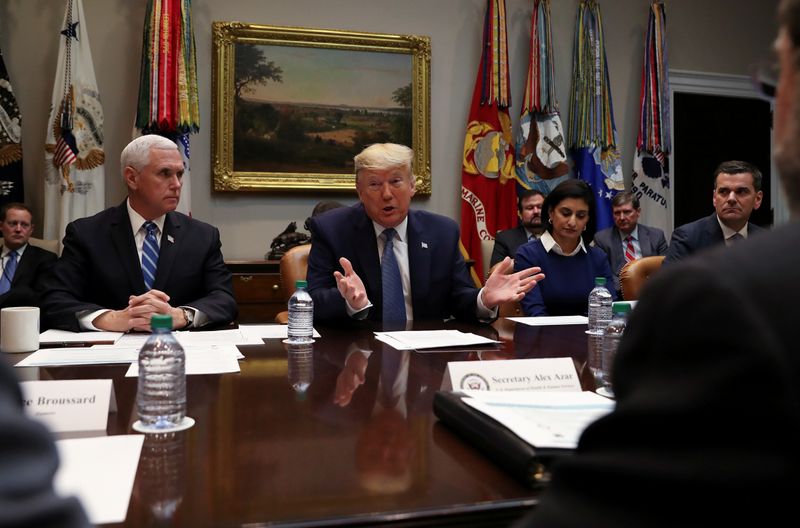By Humeyra Pamuk and Arshad Mohammed
WASHINGTON (Reuters) - The U.S. State Department has decided to suspend non-essential travel by staff because of the spread of the coronavirus and will only permit mission-critical trips, three sources familiar with the matter said on Wednesday.
One source, who spoke on condition of anonymity, said decisions about travel by employees stationed abroad would be made by U.S. embassies and consulates, while Washington-based staff must obtain approval from their bureaus.
Two other sources confirmed that U.S.-based staff needed approval from their bureaus, some of which focus on geographic areas and others on issues such as arms control. The State Department did not immediately respond to a request for comment.
Jamaican Health Minister Chris Tufton said in a tweet that a U.S. Embassy employee in Kingston, who had just returned from travel in the UK, had tested positive for the virus.
President Donald Trump has come under criticism from Democrats for initially playing down the threat posed by the virus. Trump has dismissed the accusations, saying his administration had taken early measures and that it was doing a "tremendous job" handling the crisis.
The White House is examining payroll tax relief measures, loan guarantees, reimbursing workers for lost pay, aid to small and mid-sized businesses and support for airlines, hotels and other travel businesses, Treasury Secretary Steve Mnuchin said.
The coronavirus, which emerged in China in December, has spread around the world, roiling financial markets, halting industry, bringing some flights to a standstill, closing schools and forcing the postponement of sporting events and concerts. Even the Tokyo Summer Olympics are in question.
The respiratory illness has infected more than 121,500 people across the world and has killed 4,383, the vast majority in China, according to a Reuters tally.
The number of U.S. coronavirus cases has risen steadily and affected almost three-quarters of U.S. states. More than 1,000 cases along with 31 deaths have been reported.
Depending on how State Department guidance is applied, the travel restrictions can hamper U.S. diplomacy, which draws strength from the face-to-face interactions of its thousands of employees deployed worldwide.
Earlier on Wednesday, the State Department said that out of caution because of the outbreak, it would hold by videoconference a planned meeting of foreign ministers of G7 countries that had been scheduled to take place later this month in Pittsburgh.
The World Health Organization described the new coronavirus as a pandemic for the first time on Wednesday, and urged the global community to redouble efforts to contain the outbreak, saying aggressive measures could still play a big role to curb it.
As a sign of crucial diplomatic work still ongoing, U.S. Special Representative Zalmay Khalilzad was in Kabul on Wednesday, as he worked to mediate between the Afghan government and the Taliban, after Washington struck a historic peace deal with both a few weeks ago.
